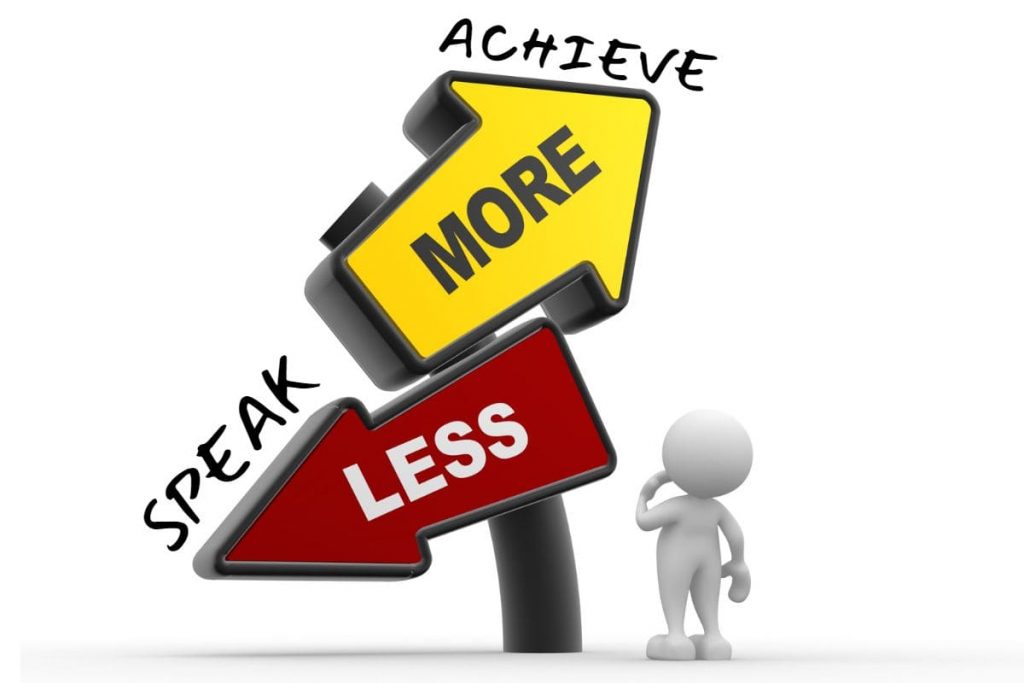Have you ever been in a meeting or a group discussion where the loudest voice in the room is often perceived as the most intelligent or competent?
The belief that the most outspoken individuals are the most intelligent and most capable is a common stereotype that can have damaging effects, particularly for those who are naturally quieter and more reserved.
But the truth is, being quiet doesn’t mean being stupid. In fact, there are many benefits to being a quiet person that is often overlooked.
In this blog post, we’ll explore how being quiet can actually be a strength, and why the idea that quiet people are less smart is straight-up wrong. Let’s do this!
Speak Less, Achieve More: The Benefits Of Being Quiet

Silence is often overlooked in today’s loud and fast-paced world, but there are many benefits to being a quiet person.
- Connect like a pro: Being quiet can help you become an active listener and master of thoughtful communication.
- Miss nothing, observe everything: Being quiet can help you pick up on the details others may overlook.
- Unlock your creative superpowers: Being quiet can help generate fresh ideas and new perspectives.
- Reflect, analyze, and conquer: Being quiet can give you the time and space to think through problems and solutions.
- Discover your inner awesomeness: Being quiet can lead to a greater sense of self-awareness and the discovery of inner strengths.
Does It Have A Negative Impact Of Applying Stereotypes?

Stereotyping can be a real party pooper for us quieter people! When we’re labeled as “quiet” or “shy,” it can take a major toll on our confidence and self-esteem.
And don’t even get us started on the unfair treatment and discrimination that can come along with those pesky stereotypes – it’s like being stuck in a never-ending game of telephone where nobody’s actually listening!
It can also be a real buzzkill in our personal relationships and social interactions, as others may not take the time to understand or appreciate our unique qualities.
And worst of all, these negative stereotypes can keep us from achieving our full potential, like a pesky rain cloud blocking our sunshine!
That’s why it’s high time we kick those labels to the curb and create a more accepting and inclusive society! We want all of you to know just because I’m quiet doesn’t mean I’m stupid.
Embrace The Power And Potential Of Being Quiet

It’s time to dispel the myth that quiet people are less intelligent or capable than their more talkative counterparts.
Just because someone doesn’t always shout their opinions from the rooftops doesn’t mean they’re stupid! Silence is not equal to stupidity nor is loud shouting.
In fact, many quiet persons are hiding some serious brain power and untapped potential that often goes unnoticed. All of these are signs of an introvert.
So if you’re someone who’s been unfairly judged or overlooked because of your introverted tendencies, it’s time to step up and show the world what you’re made of. Get ready to blow some minds and prove that being quiet doesn’t mean being dumb!
Research Shows That An Quiet Introvert Can Be… What?

Let’s talk about how being introverted or quiet doesn’t mean you’re any less smart than those outgoing extroverts!
Recent research has shown that our personality type doesn’t necessarily determine our intellectual ability or chances for success.
In fact, introverts and quiet people can excel in many areas of work and life, from deep thinking and analysis to creative problem-solving and strategic planning.
It’s all about recognizing and leveraging our unique strengths! And that’s not to say that being extroverted is any less valuable – after all, everyone brings their own set of skills and talents to the table.
But we need to broaden our definition of intelligence and recognize that there are many different types of smarts out there.
So whether you’re a social butterfly or a wallflower, don’t be afraid to embrace your strengths and let them shine!
Quiet Is The New Strong

Quiet people, listen up! Being quiet is not a weakness, it’s actually a strength that can be a game-changer in many aspects of life.
One key benefit of being quiet is the power of listening and observing. By taking the time to really tune in and pay attention, quiet people can develop insights and make meaningful connections that might be missed by those who are always talking.
And when it comes to relationships and teamwork, the value of quiet cannot be overstated. By being a good listener and creating a safe, open space for others to share, quiet individuals can build strong connections and lead teams effectively.
But that’s not all – being quiet can also facilitate personal growth and self-awareness. By taking the time to reflect and process our thoughts, we can gain a deeper understanding of ourselves and our place in the world.
And because we’re not always in the spotlight, quiet people have a unique opportunity to hone their inner strength and build resilience in the face of adversity.
So, let’s flip the script and embrace our quiet nature as a powerful asset. It’s time to let our unique strengths shine and show the world what we’re made of!

As a quiet person, it can be challenging to navigate a world. But being quiet can be a strength that you can leverage to achieve success and fulfillment in both your personal and professional life.
In this part, we’ll explore the tips and strategies you need to thrive as a quiet person and show the world that you’re a boss in your own right.

Social situations can be a challenge for us, from small talk to every other conversation, talking about real stuff. But fear not – with a little know-how, we can navigate these waters like a pro. Here are some tips to help you out:
First up, preparation is key. Before heading into any social situation, take some time to plan and practice what you want to say or do. This can help boost your confidence and reduce anxiety, making it easier to connect with others.
Next, don’t forget about the importance of self-care and setting boundaries. As quiet people, social interactions can be draining, so it’s crucial to take care of ourselves both before and after these events. Be sure to build in time for rest and recharge, and don’t be afraid to say no to social events that feel overwhelming or uncomfortable, you can not go wrong with that.
And finally, finding like-minded individuals and building a support network can make all the difference. Seek out others who share your interests and values, and don’t be afraid to put yourself out there and make connections. Having a strong support network can help boost confidence and provide a sense of belonging.
So, remember, being quiet doesn’t mean you can’t thrive in social situations. With a little preparation, self-care, and support, you’ve got this!
How To Deal With Negative Stereotypes And Unfair Treatment?

It’s no secret that negative stereotypes and unfair treatment can be a real downer. But you are safe with us – there are strategies you can use to rise above these challenges. Here are some tips to help you out:
- First up, EDUCATION and AWARENESS are key. By staying informed and challenging stereotypes whenever you can, you’re taking an important step toward positive change. You can help educate others on the strengths and abilities of quiet individuals and raise awareness about the unfair treatment that can come with negative stereotypes.
- Next, don’t be afraid to ADVOCATE FOR YOURSELF and seek out allies. Whether it’s standing up for yourself in the workplace or finding support from friends and family, having a strong network of allies can make all the difference in overcoming negative stereotypes and unfair treatment.
- And finally, remember to LEVERAGE YOUR STRENGTHS and contributions. As quiet individuals, we bring unique strengths to the table – like our ability to listen, observe, and reflect deeply.
So, stay strong, my quiet comrades! With education, advocacy, and a focus on our strengths, we can overcome negative stereotypes and unfair treatment and make a positive impact on the world.
Hope We Came From Underestimated To Unstoppable

Let’s wrap things up with a recap of the main points we’ve covered:
- Quiet people can be just as smart and successful as extroverts, and it’s important to recognize and celebrate the different types of intelligence and strengths that exist.
- Being quiet can be a strength, especially when it comes to listening, observing, and building strong relationships.
- Tips for navigating social situations as a quiet person include preparation, self-care, and finding a support network.
- Strategies for dealing with negative stereotypes and unfair treatment include education and awareness, self-advocacy, and leveraging strengths and contributions.
Now, here’s my call to action for you: let’s challenge negative stereotypes and celebrate the strengths of quiet people!
And finally, I want to encourage all of you quiet people out there to embrace your intelligence and unique qualities. You bring a valuable perspective to the world, and your quiet nature is not a weakness – it’s a strength. Keep shining in your own quiet way, and know that you are appreciated and valued just as you are.


